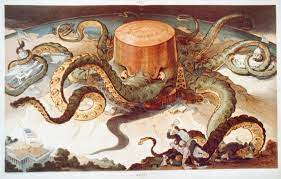Former President Theodore Roosevelt was in exile.
It was self-imposed, it was him doing the kinds of things he loved—hunting animals in the wild and being out in nature—and it was as far away from the United States as he could get.
He needed to get away from his successor, to whom he couldn’t help offering advice. About the way the public perceived Taft’s penchant for golf, his midday naps, and the appearance that if he moved at all, it was slow. That he should smile more, and get out among the people instead of cozying up to political cronies. “Lacking aggression, all [Taft] wanted was to be loved…he was everybody’s favorite fat uncle from childhood, dispensing coins and lollipops.”
The day after his decisive election, Taft went to play golf. One of his first statements to reporters as President-elect was, “I really did some great work at sleeping last night.” That quick, it became clear that this would be no energetic, proactive presidential administration.
Even though Teddy had anointed Taft President, he couldn’t trust himself to stick around and watch what happened next.
 |
| Teddy lecturing Kaiser Wilhelm II |
***
He went to Africa under contract with the Smithsonian, to analyze flora and fauna, and send back exhibits and write scientific papers.
Presidential Retirement Tip Number Two Hundred Fifty Seven: If you are fighting your impulses and ambition to keep yourself from running for president in an election you are pretty sure you can win, do NOT go on a European tour, where you will be treated like a visiting head of state by adoring crowds and European rulers.
A year after his departure from the White House, Theodore Roosevelt went on a European tour, where he was treated like a visiting head of state by adoring crowds and European rulers.
He saw firsthand the buildup of the German Army and Navy, and the apparent weakness of any European state that might oppose them. At the same time, reports of President Taft's ineptitude showed up in his daily mail.
He came back to New York in 1910, where he was met by a crowd of a million people, who howled "our next President!" at him from the sidewalks along his five mile parade route. One paper wrote that “Never before in the history of America has a private citizen possessed the power which Mr. Roosevelt now holds.”
Teddy went home to Oyster Bay, where he had a lot of thinking to do.
The presidential election of 1912 was approaching, and the next move was his.
***
Major General Ambrose Burnside, who had been appointed by President Lincoln to replace George McClellan as commander of the Army of the Potomac two years before, needed to revive his military reputation. He had performed badly at the Battle of Fredericksburg in 1863 and the Overland Campaign of 1864, and was looking for an opportunity to get back into Lincoln and Grant’s good graces.
His solution? He was going to blow some stuff up.
Stay tuned for Fire In The Hole.
***
Have a listen to the History's Trainwrecks Podcast at the links or embedded players below:
Itunes:
https://itunes.apple.com/us/podcast/id1566357950?mt=2
Google Podcasts:
https://www.google.com/podcasts...
Spotify:
https://open.spotify.com/show/0EDHR8NUqtfUYbL5l3Mr28
Audible:
https://www.audible.com/pd/Podcast/B08JJMCMYV...
IHeart Radio:
https://www.iheart.com/.../269-historys-trainwrecks.../
Amazon Music:
https://music.amazon.com/.../e2a604.../history's-trainwrecks





